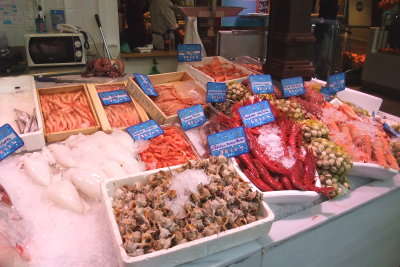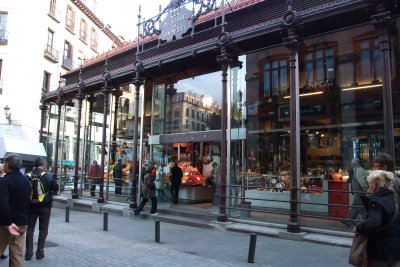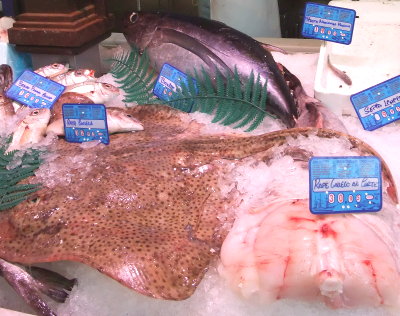Will we still be able to eat swordfish, tuna loins, tasty grouper, octopus and native mussels and oysters from near home or will we eat jellyfish burger in the future? What can we learn from the culinary seafood traditions and the culture of the many nationalities that have developed a love for the sea and its food? Quite a few have also settled in Brussels and Belgium leaving a stamp on the eating habits of the European capital. This is the beginning of a series of invited articles and activities, which we will feature in 2012, in the occasion of the year of gastronomy in Brussels, ‘Brusselicious’, and the growing attention to issues of food, culture and food security.
The present article is the result of a short visit of the San Miguel Market in Central Madrid in May 2010 and the curiosity for this building from the turn of the last century, which sits slightly uneasily in midst more modern surroundings today. The surroundings and the homonymous square were apparently places of large open street markets, some of the activities dating back to medieval times (Photos by CE Nauen).
The urbanisation process and increasing hygiene requirements led to the built-up of the rectangular building in wrought iron, wood and ceramics of approximately 2000 sqm. The glass windows are a later addition. The plans were from architect Alfonso Dubé y Díez and have some resonance with ‘Les Halles’ in Paris and other closed markets of the same epoch in other European capitals.

The new market opened in 1916, at the time specialised in fish and fishery products, for which there was always a great appetite in Madrid, despite its position in the central highlands, far away from the coasts of the Iberian peninsula. Several other markets of a similar type were constructed in Madrid to meet the demand of a growing population, but fell into disrepair and were flattened lateron.The San Miguel Market is the only one to survive from this period.
In 1999 the city of Madrid started the refurbishing of the dilapidated building using European funding and financial contributions from the commercial companies interested. As the market could not compete as such against more fashionable supermarkets, the original concept gave way to specialty food stalls and revival of traditional and modernised culinary culture.
The company El Gastrónomo de San Miguel now running the market leads efforts to combine high quality and seasonal food from the vicinity of Madrid, Spain and even from abroad with a cultural programme. It is located on Plaza San Miguel and was reopened in 2009.

Stands with produce for sale are next to bars, proposing a lifestyle of slowing down and enjoying the moments of tapas and other food and wine tasting and culture at different times throughout the day. With lots of fruit and vegetables on sale, seafood is no longer the principal offer, but still a source of attraction as can be seen from the photos. Particular care is taken to offer a diversity of fresh seafood in very good conditions.
Like in many other places, freshness and fine display are more important sales points than sourcing from sustainable fisheries. Here, like in many other markets, supermarkets and food company websites, environmental aspects have not yet reached a level of awareness that they are part of the display and sales strategy. Yet, that needs to become the next level of modernisation.

Il mare ci nutre
- World Food Day 2024, Joint Webinar with Fish Party
- Relatore Speciale delle Nazioni Unite sul diritto al cibo
- EP Hearing on EU Citizen Initiative to stop shark finning
- Keynote at the ‘Feed the Future – Innovation Lab for Fish’
- FAO webinar ‘Pesce piccolo a basso prezzo: dall’esca al piatto’, 15-16/02/2021
- Pesce e frutti di mare deliziosi e sostenibili ai workshop di Mundus maris
- Chiloé, ossia: il disastro di Salmonopoli
- Seafood Symposium – Dalla pesca ai buongustai, 27 Aprile 2015
- Baltic students concerned about sustainable foods, Rogow, Poland, 15-19 April 2015
- Dai piatti al carburante – il controverso boom delle alghe in Cile
- Khazan – Traditional coastal zone management in Goa, India
- Comportamento del consumatori attento all’ambiente nel settore alimentare: cosa posso fare?
- Save baby fish or Point ‘n’ kill?
- “Inseparable” – La campagna sulla sostenibilità del pesce celebra un evento ad Atene
- Respect for minimum fish size. What do Senegalese fish mongers have to say?
- La campagna di Mundus maris nei mercati di Dakar
- Salviamo gli Oceani! – Cercle Europa esorta
- International Study Group Brussels: Save the Seas!
- Mercado San Miguel in Central Madrid
